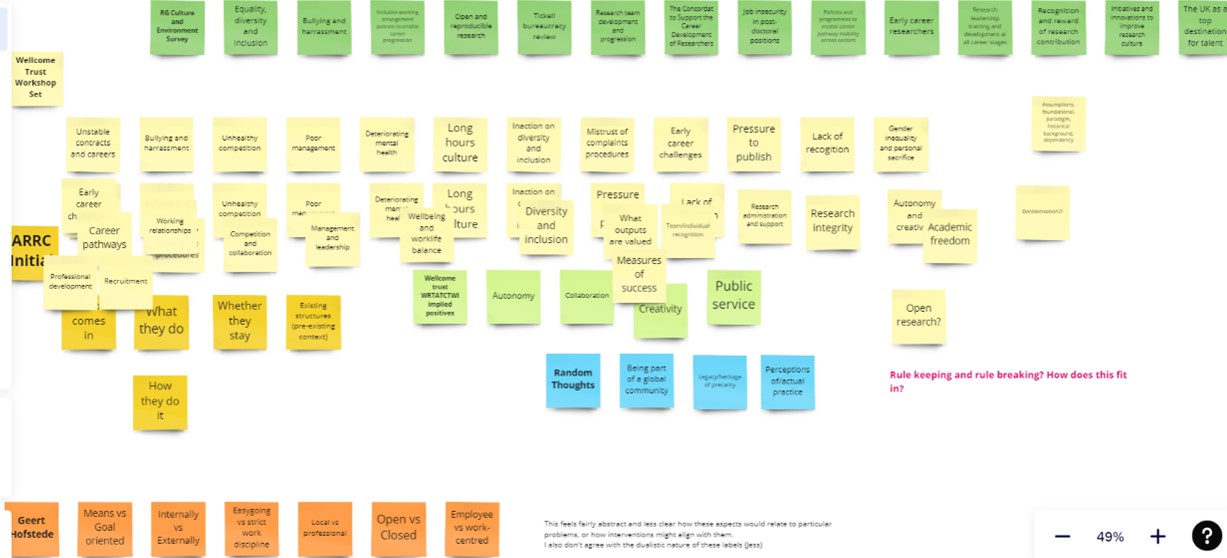Submitted by K.M. Dawson on Tue, 05/09/2023 - 17:24
The difficulty in defining ‘research culture’
When we talk about research culture to other researchers, they often have an instinctive understanding of what we mean, but a precise definition has been hard to come by. This is because there tends to be a nucleus of topics that many agree are central to the terminology (such as collegiality and reward and recognition) and other topics that orbit the nucleus, which some would include in a definition and some would suggest are more allied (such as open research).
The definition also transcends the research sphere, when we consider the general concept of ‘culture’.
To quote a paper by Professor Helen Spencer-Oatey: ‘culture is a notoriously difficult term to define’. Indeed this paper [1] is entitled ‘What is culture? A compilation of quotations.’ Of the multiple definitions given, one of the more succinct is from Matsumoto 1996:16 -
‘... the set of attitudes, values, beliefs, and behaviors shared by a group of people, but different for each individual, communicated from one generation to the next.’
However, another quote that resonates is that:
‘Culture is a ‘fuzzy’ concept, in that group members are unlikely to share identical sets of attitudes, beliefs and so on, but rather show ‘family resemblances’, with the result that there is no absolute set of features that can distinguish definitively one cultural group from another.’
Therefore, while we may develop a working definition, research culture may be a concept that, by its very nature, needs to remain incomplete.
So what are the ‘family resemblances’ among researchers and how can we identify them? We could take a theoretical or a practical approach to this issue. The ARRC study has (so far) taken a fairly practical approach, based on the necessity to find areas that can be tractably examined. We chose our project strands – based around hiring, management and precarity - as they are current, pressing and under discussion by the research community as it stands. For example, Narrative CVs (hiring) are an initiative being rolled out as we speak, yet are relatively untested.
For our more theoretical work on research culture, we plan to write review papers from the lens of our partner institutions – based in The Netherlands, Germany and Switzerland (as well as the UK). Profiling the initiatives each of these countries are highlighting (and funding) will allow us to situate our study in the wider landscape of research culture priorities.
We have also attempted to construct frameworks that encompass many of the topics under discussion.
As you can see from one of our mind-maps (above) our initial thoughts were.. complex. We took inspiration from various existing reports, such as those from Wellcome and the Russell Group.
We eventually came to the smaller number of categories below:
1 |
2 |
3 |
4 |
5 |
6 |
|
Recruitment
Processes
|
Career
Pathways
|
Professional
Development
|
Working
Relationships
|
Competition
and
Collaboration
|
Management and Leadership
|
7 |
8 |
9 |
10 |
11 |
12 |
| Research Admin and Support | Wellbeing and Work/Life Balance | Diversity and Inclusion | Which Outputs are Valued | Individual vs Team Recognition | Research Integrity |
Because of the issues noted previously, these groupings will likely continue to be in flux. Our thinking will evolve as we interact with others over the course of the project. It is also likely that the most salient issues for any one individual will depend on their career stage, discipline and other priorities. As we develop nuance in our understanding over the next few years, we may be able to structure part of our framework relative to this, for example: what are the most important issue for postdocs?
A whole other exciting area which we haven’t even got to yet is the drivers behind cultural change. Watch this space, and if you have thoughts or are a researcher who studies culture we’d love to hear from you.
The ARRC team.
[1] Spencer-Oatey, H. (2012) What is culture? A compilation of quotations. GlobalPAD Core Concepts. Available at GlobalPAD Open House http://www2.warwick.ac.uk/fac/soc/al/globalpad/interculturalskills/

